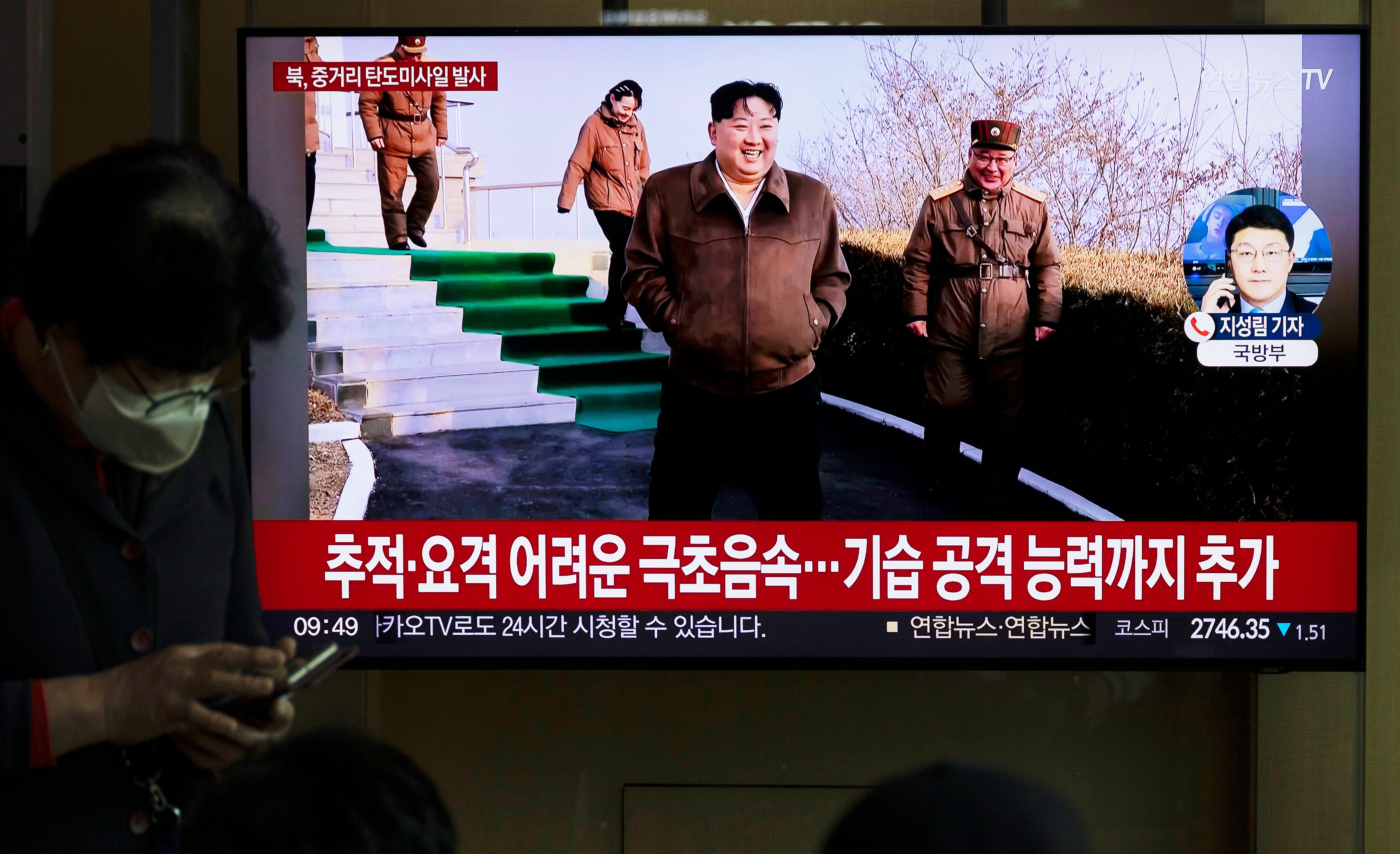North Korea fires ballistic missile into eastern waters ahead of key South Korea vote
Test launch sets off alarm bells in South Korea which is set to undergo elections on 10 April
North Korea test-launched a suspected intermediate-range ballistic missile towards its eastern coast amid fears of Pyongyang upping the ante in the crucial days leading up to the national election in Seoul.
South Korea’s Joint Chiefs of Staff said North launched the IRBM from near capital Pyongyang at 6.53am local time on Tuesday.
The missile flew about 650km with a maximum altitude of 100km before landing in waters outside of Japan’s exclusive economic zone, the Japanese Defence Ministry said in a more detailed review.
The IRBM landed off North Korea’s northeast coast after a flight of around 10 minutes, the ministry said. The test launch has set off alarm bells in South Korea which is set to undergo a national vote on 10 April in which president Yoon Suk-yeol is vying for a second term.
The move drew immediate criticism from South Korea and Japan.
The South Korean president said Kim Jong-un’s regime in North Korea is trying to create commotion in the region with its military provocations.
“The North Korean regime is trying to shake our society ahead of general elections through continued military provocations including missile launches,” Mr Yoon said.
"These provocations will only end up uniting the minds of our people strongly."

Japanese prime minister Fumio Kishida said no damage related to the missile was reported. He said North Korea‘s frequent missile launches “threaten the peace and safety of not only Japan but also the region and the international security”.
Leif-Eric Easley, a professor at Ewha University in Seoul, said the test is unlikely to swing any National Assembly seats in South Korea while North Korea continues to present challenges with its military provocations.
“The Kim regime prioritizes advancing its military capabilities and doesn’t care to stay quiet during the South Korean legislative election campaign. But firing an intermediate-range missile lacks the shock value of a full-range ICBM (intercontinental ballistic missile) launch or a nuclear test, so it’s unlikely to swing any National Assembly seats.
“Although Pyongyang’s weapons development remains a major concern, Seoul is currently focused on health care reform, economic policies, and domestic political scandals.”
The launch follows the March test of a solid-fuel engine built for a new intermediate-range hypersonic missile that Pyongyang has been developing. It is seen as an effort to boost military muscle with weapons that could reach the US Pacific military hub of Guam and beyond, analysts said.
Mr Kim oversaw the test launch of a solid-fuel engine for a new type of intermediate hypersonic missile on 19 March. Following the launch, Mr Kim said the strategic value of such weapons would be just as important as his intercontinental ballistic missiles targeting the US mainland.
It was after Mr Kim also supervised a live-fire drill of artillery systems designed to target South Korea‘s capital on 18 March.
Tuesday’s test was North Korea’s third ballistic missile launch this year so far.
Japan’s coast guard shared an assessment of the country’s Defense Ministry that the missile has already landed but still urged caution for vessels passing the area.
It comes as South Korean defence minister Shin Wonsil said North Korea is believed to have shipped around 7,000 containers of weapons since Mr Kim and Russian president Vladimir Putin met for a summit last year in September.
Both North Korea and Russia have denied reports of weapons transfer amid the war in Ukraine.
Join our commenting forum
Join thought-provoking conversations, follow other Independent readers and see their replies
Comments
Bookmark popover
Removed from bookmarks